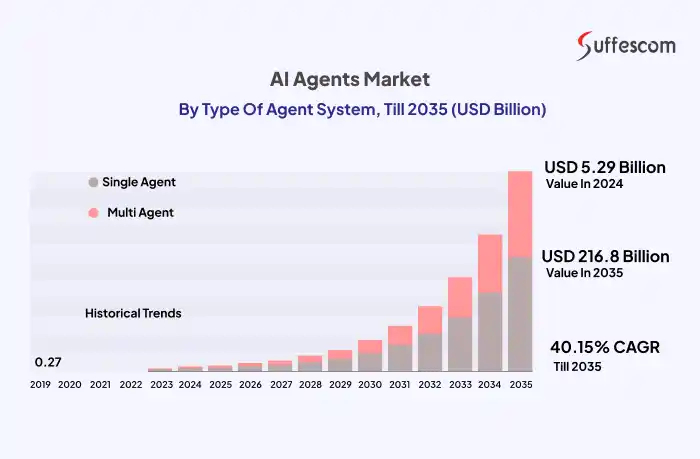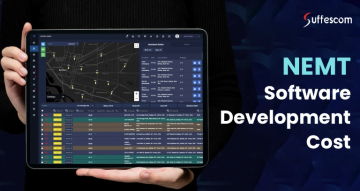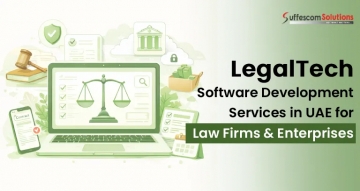How to Integrate AI Agents into Businesses: Priceless Guide

AI isn’t just about chatbots or predictive analytics anymore. AI Agents are a different breed. They’re decision-makers that can learn, adapt, and act on their own. Businesses are realizing this fast. Finance teams use them to detect fraud, hospitals use them to support doctors, retailers use them to personalize shopping.
If you’re trying to understand what AI Agents are, how they work, and how they can be integrated into your business systems, you’re in the right place. Let’s break it down.
What Are AI Agents and Why They Matter?
An AI Agent is basically an intelligent software entity. It doesn’t wait for you to click a button. Instead, it observes, processes data, makes decisions, and executes tasks to achieve specific goals.
Think of it as having a digital teammate that never sleeps, keeps learning from experience, and adapts to new challenges. This is why businesses are betting on AI agent integration services to stay ahead.
How To Integrate AI Agents In Website and Apps?
Unlock the potential of artificial intelligence agents with our AI development company. Seamlessly integrate advanced solutions for enhanced automation, decision-making, and problem-solving. Experience the myriad benefits of AI agents across industries, from increased efficiency to personalized user experiences.

Key Functions of Custom AI Agents Integration
AI Agents is a flagship of technological advancement encompassing a spectrum of skills that allow them to develop relationships with their environments. Now, let's dive deep into the core roles of these devices.
Perception
Such productive algorithms, which shape AI Agents, are armed with the ability to spot and decode any environmental shifts. They gather information, analyze data, and make sense of complicated scenarios via sensory inputs and data streams. This function furnishes them with the ability to comprehend their context, pick out critical signals, and derive applicable information.
Response
AI agents are dynamic devices that perceive actions and changes and respond to them based on the information coming from the data they acquire. Whether their task is to find an optimal value in a manufacturing parameter, control traffic flow in a city, or detect anomalous transactions in the financial industry, these agents react promptly and effectively to any fluctuations.
Reasoning & Interpretation
The very core of AI Agents' utility is their capability to reason and interpret the facts. These agents can engage and access big data sets, delving into the details, identifying correlations, and drawing useful conclusions using up-to-date algorithms and computation power. This is the basis of their ability to select the right options and overcome complexities within various disciplines.
Problem-Solving
AI Agents outperform people when it comes to problem-solving, undertaking tasks that humans may not be able to deal with due to their complexity or scope. This intelligence can range from deploying its abilities to optimize logistical processes to performing medical diagnosis. Such humanoid agents employ a perpetual, iterative approach that uses past outcomes to update on current approaches, hence leading to optimal outcomes.
Inference From Experiences
Based on the accumulated experiences from past interactions and results, AI Agents use inferential reasoning, which entails reasoning about things and events based on evidence and logic. The agent's success is contingent on their ability to consistently learn and adapt their strategies, thus improving the accuracy of their predictions and changing their behavior.
Action
The combination of perception, reasoning, and problem-solving will lead to decisive actions. AI Agents carry out orders, apply solutions, and coordinate their actions to attain the committed goals. It may be the case that these agents are equipped with capabilities such as autonomy, predictive maintenance, and personalized recommendations.
Types of AI Agents Integration Service: Types That Fit Real Business Use Cases
Intelligence Agents within the realm of AI incorporate an extensive range of capabilities and solutions that cater to different problems and situations. Every AI-based agent provides individualized capabilities and state-of-the-art solutions that are usable separately or even in combination to address a specific need in different domains. Here are the main types you’ll come across:
Reflex Agents
These agents rely on a simple stimulus-response mechanism; they instantly react to the external inputs without executing any internal state or storing any memory. They have less complex perceptions than other systems, allowing them to make decisions that require immediate action based on simple rules or patterns.
Model-Based Reflex Agents
Unlike simple reflex agents that act in response to environmental stimuli, these agents are equipped with internal models that allow them to anticipate the impact of particular behaviors. Running simulations with all possible outcomes while considering current and future states can achieve a calmer and more proper decision-making process.
Goal-Based Agents
The agents with goal-based behavior are scripted to pursue their objectives in preference to quick action to a stimulus. They consider the possible effects of different actions and decide on those aligned with their aims, thus progressing towards their ultimate objective.
Utility-Based Agents
Utility-based agents use utility functions to measure the 'goodness' of different states and outcomes by assigning a numerical value to each state. In contrast with a narrow-minded approach to achieving goals, they take into account the totality of the pleasure or contentment related to diverse options.
Learning Agents
Learning improves through experience through continual adaptation and improvement in performance over time. Learning agents learn to adapt their behavior through environmental interactions using techniques such as artificial intelligence (machine learning, reinforcement learning) and others.
Multi-Agent Systems
Agent systems incorporate AI agents that interact with each other in a certain environment. These agents act in different ways, i.e., collaborate, compete, or negotiate, in which they have a shared or conflicting objective. This leads to emergent behaviors and complex interactions.
Hierarchical Agents
Hierarchical agents are arranged so that several levels of abstraction and decision-making come together. They break down complex tasks into simple subtasks that optimize faster problem-solving and rational resource utilization.
AI Agents Integration Services
Integrate intelligent AI agents into your existing systems to automate workflows, improve decisions, and scale operations faster with measurable ROI.
AI Agent Integration: How It Works
With the increased penetration to integrate AI agents into your existing ecosystem, endless opportunities exist. AI-powered agents can interact among themselves, find and trade, and thus create a robust and novel market structure, impacting how transactions occur. They can autonomously perform tasks dependent on AI usage, realizing their full potential by automating regular tasks and analyzing complex data. There are two main approaches:
AI Gateway Integration
The AI Gateway Integration enables companies to integrate AI agents into their existing ecosystem with unified operations. The AI Agents can interact with different digital tools through their APIs, making it possible to automatically route complicated processes. This integration is accomplished with the help of NLP (Natural Language Processing) and machine learning models, which evaluate the documentation and provide precise commands.
Direct AI Agents Integration
AI Integration is a process of feeding AI Agents into the system. The Agents are then able to interact with other systems, analyze data, make decisions, and perform tasks automatically. This integrating feature allows businesses to utilize AI Agents' capabilities to optimize processes, improve efficiencies, and achieve advancements.
Recognizing and Obtaining Data
AI Agents for Business start by getting information from several places—customers, past transactions, CRM systems, popular social media sites, internet-connected gadgets, and more. This information helps us see how users work, what they like, and what they require. AI business agents are created to process lots of up-to-date data, ensuring they keep track of the most accurate facts.
Example: A retail business applies AI programs to understand what people are browsing online and on social media to help offer products that match their interests.
Decision-Making
Thanks to advanced algorithms and deep learning, AI Agents in Business review the gathered data to spot patterns, judge intentions, and act accordingly. Whether servicing customers or suggesting enhancements, these agents improve as they gather feedback from situations and the system platform.
Example: A fintech organization relies on AI to catch suspicious activity in accounts and decide immediately whether to label it fraud, allow the transaction, or require proof from its users.
Action Execution
Once a decision has been made, AI Agents move quickly to automate tasks such as answering queries, processing sales, or assigning tasks to employees. Performing various duties simultaneously in several applications makes businesses much more adaptable and lessens service bottlenecks. Any company seeking to increase productivity group-wide will find AI Agents for Enterprises very beneficial.
Example: A logistics company uses AI agents to automatically update delivery status across the CRM, notify customers via SMS, and flag delays in the operations dashboard—all triggered by a single scanned barcode at a warehouse.
Learning and Adaptation
Their learning and development capabilities are very valuable for businesses. Thanks to reinforcement learning and real-time feedback, these agents keep updating their approach, respond more carefully, and alter their actions in the long run. Due to this, they keep up with how a business aims to grow, what users need, and current trends.
Example: A healthcare AI agent that initially handled appointment bookings evolves to also provide symptom triage based on feedback and new medical data, improving diagnostic support over time.
Collaboration with Human Teams
AI Agents for enterprises assist humans rather than replace them. They may partner with teams by giving employees data insights, retrieving the information they require, and simplifying tasks. Agents support live operators by recommending ways to answer or by taking care of first-level questions so people can concentrate on tough situations.
Example: In a customer service center, an AI agent listens to live chat conversations and suggests responses, relevant policies, or product pages to the support agent in real time.
Context Awareness
AI Agents in business today understand their surroundings and use that understanding. They use information about a user's goal, mood, place, and device to offer more personal results. When a company can notice a sense of urgency in a customer's complaint or returning users, interaction quality and user satisfaction rise.
Example: A travel platform's AI agent detects that a customer is accessing their account from an airport and proactively offers assistance with flight delays, rebooking options, and directions to lounges.
Multi-Channel Integration
AI Agents for Business function seamlessly across communication channels like chat, voice, email, SMS, and social platforms. They ensure consistent experiences regardless of the platform, maintaining conversation continuity so users never have to repeat themselves—an essential trait for modern omnichannel strategies in large enterprises.
Example: A telecom provider's AI agent follows a customer conversation from chatbot to phone support, automatically briefing the human agent with the chat history to avoid repetition and speed up resolution.
Compliance and Governance
AI Agents for Enterprises are crucial in heavily regulated industries in ensuring compliance. These agents can be configured to follow audit rules, adhere to security protocols, and document every action for traceability. Automating compliance checks and maintaining detailed logs helps reduce risk and ensure regulatory readiness.
Example: A banking AI agent monitors every transaction in real time, flags any activity that violates KYC norms, and generates instant compliance reports for auditors, saving both time and legal risk.

Benefits of AI Agent Integration for Businesses
Using AI agents in business can produce many benefits, such as perpetuating operations and exploiting potential. Integrating AI agents into your existing ecosystem broadens the possibilities for entities to run more efficiently, offer personalized customer experiences, link together operations quickly, and rely on data-driven decision-making to remain competitive.
Improved Efficiency: AI agents simplify routes by creating tasks oriented on repetition, which, in turn, increases the amount of attention that employees can direct to the strategic side of work. Through speed and accuracy modulation, smart machines enable faster task completion, thus facilitating fast decisions and increasing the working pace.
Effective Personalization: AI Agents employ data science and machine learning algorithms to obtain personalized customer experiences. Using data analytics, agents can act in real-time to personalize recommendations, target ads, and customize communication channels according to each user's needs and preferences.
Seamless & Cost-Effective Scalability: AI Agents provide effective solutions that easily adjust without the need for major changes in business requirements by artificial intelligence. Whether it comes to handling increasing customer inquiries or processing giant volumes of data, these agents can adjust their operational capacity as needed to match optimal resource utilization and cost efficiency.
Data-Driven Insights: AI agents help process large volumes of data in real-time, and thus, they give reasonable findings that improve the decision-making process. Businesses use these understandings to discover trends, address the market’s necessity, and develop strategies to work effectively and compete highly in the market.
Business Sectors Benefitting From AI Agents
AI agents, or artificial intelligence agents, are widely adopted by many businesses for their task automation, data analysis, and decision-making capabilities. Here's a breakdown of how businesses integrate AI agents into your existing ecosystem:
Finance & Banking
AI agents are used in market analysis, fraud detection, risk assessment, algorithmic trading, chatbot decision-making, and personalized financial advice. They examine big data sets to unveil trends and unusual occurrences that guide decision-making.
Healthcare
AI healthcare systems diagnose diseases, analyze medical images (such as X-rays and MRI scans), discover drugs, customize treatments for patients, and manage electronic health records in healthcare. Virtual health assistants are also involved in patient care support and assistant services.
Retail
AI agents are used for fabric control, demand forecasting, behaviorally based marketing, customer servicing (chatbots via inquiry and help desk), and recommendation systems. They investigate customer behavior to present customized products in a targeted manner with offerings.
Manufacturing
AI agents enhance production processes, predict the condition of equipment, help improve the quality of products through image recognition, and manage supply chains more effectively. It results in cost-cutting and improved productivity.
Customer Service
AI bots are found in many customer service roles across different sectors. AI-powered chatbots address simple inquiries, help customers, and, when required, refer them to human agents for complex issues. They work 24/7 and, therefore, improve response time and customer service.
Transportation & Logistics
AI for logistic systems perform route planning for deliveries, estimate maintenance requirements for vehicles and infrastructure, operate traffic lights and flow control, and increase safety using systems like autonomous vehicles and accident prediction systems embedded into critical systems to avoid them.
What are the AI Agent Use Cases in Business?
Use Cases of AI Agents in Business demonstrate how intelligent automation revolutionizes industries by streamlining operations, personalizing customer experiences, and enhancing data-driven decision-making.
Retail
AI agents in retail and e-commerce revolutionize customer interactions by offering personalized shopping experiences, real-time product recommendations, and automated support. They optimize inventory management, streamline order processing, and reduce cart abandonment by engaging customers with timely messages and offers.
Expert Opinion:
"Retail AI agents bridge the gap between data and action. Analyzing customer behavior in real time enables brands to deliver highly personalized experiences that drive conversion and loyalty."
— Lisa Graham, Senior Retail Technology Analyst at Forrester
Healthcare
AI agents enhance patient care by automating appointment scheduling, providing symptom-based assistance, and managing post-treatment follow-ups. They also support medical staff with diagnostic insights, automate medical coding, and improve administrative efficiency in clinical settings.
Expert Opinion:
"AI agents are redefining patient engagement. They enable healthcare providers to deliver more responsive, data-driven care while easing the administrative burden on clinical staff."
— Dr. Michael Tan, Health Informatics Researcher at Mayo Clinic
Banking & Finance
AI agents help banks and financial institutions automate customer service, detect real-time fraud, and respond instantly to account inquiries. They also assist in credit scoring, financial planning, compliance monitoring, streamlining operations, and improving risk management. Additionally, specialized AI agents for trading are revolutionizing investment strategies by analyzing market data in real-time and executing trades with precision.
Expert Opinion:
"AI agents offer a powerful combination of speed, accuracy, and compliance. In finance, this means better fraud detection, smarter advisory services, and seamless customer support."
— Rachel Kim, FinTech Analyst at CB Insights
Manufacturing
In manufacturing, AI agents monitor equipment for predictive maintenance, optimize production schedules, and manage supply chain logistics. They enhance product quality by detecting anomalies and defects early, thus minimizing downtime and improving overall efficiency.
Expert Opinion:
"The integration of AI agents in manufacturing allows for operational foresight and previously unattainable efficiency. They're key to smart factory evolution."
— David Walters, Industrial Automation Specialist at Siemens
Telecommunications
Telecom companies deploy AI agents to handle high volumes of customer service requests, troubleshoot connectivity issues, and assist with account management. These agents also analyze usage patterns, predict network failures, and recommend personalized plans to customers.
Expert Opinion:
"AI agents have become indispensable in telecom, enabling providers to proactively address service issues, reduce churn, and tailor offerings based on individual usage data."
— Aisha Hassan, Technology Analyst at GSMA Intelligence
Education & EdTech
AI agents support personalized learning by adjusting content delivery based on a student's pace and performance. They also assist with grading, attendance tracking, and answering administrative or course-related queries, freeing educators to focus more on teaching.
Expert Opinion:
"With AI agents, education is becoming more adaptive and inclusive. They help personalize learning at scale while improving teacher productivity."
— Dr. Emily Zhou, EdTech Researcher at Stanford Graduate School of Education
Travel & Hospitality
Travel companies use AI agents to help customers book flights, hotels, and experiences in real time. These agents handle inquiries, manage cancellations, and provide travel updates, enhancing customer convenience and satisfaction throughout the journey.
Expert Opinion:
"AI agents are enhancing the travel experience by making it seamless and personalized. From planning to post-trip support, they help brands stay connected to travelers 24/7."
— Tom Becker, Hospitality Innovation Consultant at Skift Research
Real Estate
In real estate, AI agents act as virtual assistants that guide users through property searches, answer questions, and schedule tours. They streamline lead management, qualify prospects, and automate documentation, reducing manual work for agents and agencies.
Expert Opinion:
"AI agents are transforming the real estate journey into a faster, more informed, and interactive experience—drastically reducing the sales cycle and improving lead conversion."
— Sandra Lee, PropTech Thought Leader at CREtechl
The Future of AI Agents in Business
AI Agents are on the verge of becoming a key component of the digital future. Driven by ongoing development, AI Agents are in line to be more intricate in their functionality and able to carry out and handle complex tasks and decisions. The path for AI agent adoption is progressing both locally and globally, with contributions from leading AI agent development companies pushing the boundaries of what’s possible. In view of the fact that AI technology is changing so fast, businesses will need to take proactive steps by improving their technological infrastructure, exploring new applications, and creating a dialogue with regulatory bodies for the planning of future AI governance.
AI Agents are innovative entities that will initiate the next wave of digitalization. With businesses competing for relevance and efficiency, AI and Robotics must be embedded in their systems, often with the expertise of an AI agent development company to ensure seamless integration. On the other hand, the road to integrate AI agents into your existing ecosystem should have the consideration of ethical issues, data privacy, and security as the focus while the process is undertaken. With AI Agents, businesses can unlock a high level of advancement, productivity, and innovation through efficiency.
FAQs
1. What is an AI Agent in simple terms?
It’s a software program that observes, thinks, and acts to achieve specific goals.
2. How do AI Agents integrate with existing systems?
Through APIs, gateways, or direct embedding into enterprise tools.
3. Are AI Agents secure?
Yes, if developed with strong security and compliance measures. Data encryption and access controls are key.
4. How much does AI Agent integration cost in 2025?
It varies by project, but businesses should expect a tailored solution based on complexity and industry needs.
5. How long does it take to deploy AI Agents?
Anywhere from a few weeks to a few months depending on scope and system readiness.







